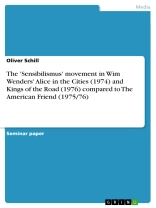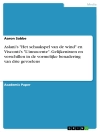Seminar paper from the year 2003 in the subject Film Science, grade: B, Concordia University Montreal (Mel Hoppenheim School For Cinema), course: New German Cinema, language: English, abstract: “Never before and in no other country, were pictures and language in general treated with fewer consciences than here [in Germany].” Wim Wenders wrote in an article about Joachim Fest’s documentary Hitler- Eine Karriere (Hitler – A Career). “I don’t think, that anywhere else has been such a loss in terms of confidence in the own pictures, the own histories and the own myths, than with us.” (Novell-Smith, p.566)
These lines, which Wim Wenders wrote in the article, stand for the situation of the German film during at least 30 years. The heritage of the film of the Third Reich – the instinctively mistrust against all pictures and histories, which concern the German identity – was the main goal for the German directors of the 60s and 70s to work on. The new German cinema saw itself as part of the political public education system. After the Manifest of Oberhausen in 1962 several German filmmakers decided to make independent productions of film.
“[…]We declare that our ambition is to create the new German feature film. This new film requires new freedoms. Freedoms from commercial influences. Freedom from the dominance of interest groups.” […] (Excerpt of the Oberhausen Manifest in Pflaum, Hans Günther. Cinema in the Federal Republic of Germany. Trans. Timothy Nevill. Published by Inter Nationes. Bonn 1993, p.9)
Although not mentioning the question of financial support, the young enthusiastic filmmakers hoped to get money from the government in order to be able to work as “authors”. The government saw the cultural advantages of a strong national cinema and found 1965 the Kuratorium Junger Deutscher Film (Board for the New German Film). “Debuts by directors such as Alexander Kluge, Peter Fleischmann and Werner Herzog were assisted by awards from the Board.”[…] Little was changed by the law regulating assistance for the German film which came into force in 1968. With the conditions of production prevailing in this country in the mid-Sixties, it was basically impossible to implement the “new language” postulated in the Oberhausen Manifesto.” (Pflaum, p.10) The state-funded German cinema seemed so to have a secret, special cultural order from the government to present Germany to the rest of the world as a cultural motivated and especially self-critique country. That’s what the following lines are about and how it came to these years were simply named ‘New Sensibilismus’.
Oliver Schill
The ‘Sensibilismus’ movement in Wim Wenders’ Alice in the Cities (1974) and Kings of the Road (1976) compared to The American Friend (1975/76) [EPUB ebook]
The ‘Sensibilismus’ movement in Wim Wenders’ Alice in the Cities (1974) and Kings of the Road (1976) compared to The American Friend (1975/76) [EPUB ebook]
Beli ebook ini dan dapatkan 1 lagi PERCUMA!
Bahasa Inggeris ● Format EPUB ● ISBN 9783638245241 ● Saiz fail 0.2 MB ● Penerbit GRIN Verlag ● Bandar raya München ● Negara DE ● Diterbitkan 2004 ● Edisi 1 ● Muat turun 24 bulan ● Mata wang EUR ● ID 3692223 ● Salin perlindungan tanpa












